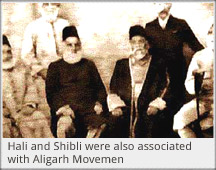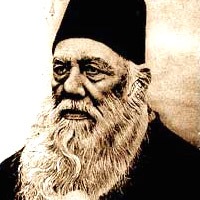The War of Independence 1857 ended in disaster for the Muslims. The British chose to believe that the Muslims were responsible for the anti-British uprising; therefore they made them the subject of ruthless punishments and merciless vengeance. The British had always looked upon the Muslims as their adversaries because they had ousted them from power. With the rebellion of 1857, this feeling was intensified and every attempt was made to ruin and suppress the Muslims forever. Their efforts resulted in the liquidation of the Mughal rule and the Sub-continent came directly under the British crown.
After dislodging the Muslim rulers from the throne, the new rulers, the British, implemented a new educational policy with drastic changes. The policy banned Arabic, Persian and religious education in schools and made English not only the medium of instruction but also the official language in 1835. This spawned a negative attitude amongst the Muslims towards everything modern and western, and a disinclination to make use of the opportunities available under the new regime. This tendency, had it continued for long, would have proven disastrous for the Muslim community.
Seeing this atmosphere of despair and despondency, Sir Syed launched his attempts to revive the spirit of progress within the Muslim community of India. He was convinced that the Muslims in their attempt to regenerate themselves, had failed to realize the fact that mankind had entered a very important phase of its existence, i.e., an era of science and learning. He knew that the realization of the very fact was the source of progress and prosperity for the British. Therefore, modern education became the pivot of his movement for regeneration of the Indian Muslims. He tried to transform the Muslim outlook from a medieval one to a modern one.
Sir Syed’s first and foremost objective was to acquaint the British with the Indian mind; his next goal was to open the minds of his countrymen to European literature, science and technology.
Therefore, in order to attain these goals, Sir Syed launched the Aligarh Movement of which Aligarh was the center. He had two immediate objectives in mind: to remove the state of misunderstanding and tension between the Muslims and the new British government, and to induce them to go after the opportunities available under the new regime without deviating in any way from the fundamentals of their faith.
 Keeping education and social reform as the two planks of his program, he launched the Aligarh Movement with the following objectives:
Keeping education and social reform as the two planks of his program, he launched the Aligarh Movement with the following objectives:
- To create an atmosphere of mutual understanding between the British government and the Muslims.
- To persuade Muslims to learn English education.
- To persuade Muslims to abstain from politics of agitation.
- To produce an intellectual class from amongst the Muslim community.
Fortunately, Syed Ahmad Khan was able to attract into his orbit a number of sincere friends who shared his views and helped him. Among them were well-known figures like Nawab Mohsin-ul-Mulk, Nawab Viqar-ul-Mulk, Hali, Shibli, Maulvi Nazir Ahmad, Chiragh Ali, Mohammad Hayat, and Zakaullah. Above all, his gifted son Syed Mahmud, a renowned scholar, jurist and educationist, was a great source of help to him.
Syed Ahmad also succeeded in enlisting the services of a number of distinguished English professors like Bech, Morison, Raleigh and Arnold who gave their best in building up the Aligarh College into a first-rate institution.
A brief chronology of Syed Ahmad’s efforts is given below:
1859: Built Gulshan School in Muradabad.
1863: Set up Victoria School in Ghazipur.
1864: Set up the Scientific Society in Aligarh. This society was involved in the translation of English works into the native language.
1866: Aligarh Institute Gazette. This imparted information on history; ancient and modern science of agriculture, natural and physical sciences and advanced mathematics.
1870: Committee Striving for the Educational Progress of Muslims. 1875: Muhammadan Anglo-Oriental School (M. A. O.), Aligarh, setup on the pattern of English public schools. Later raised to the level of college in 1877 and university in 1913.
1886: Muhammadan Educational Conference. This conference met every year to take stock of the educational problems of the Muslims and to persuade them to get modern education and abstain from politics. It later became the political mouthpiece of the Indian Muslims and was the forerunner of the Muslim League.
 Besides his prominent role in the educational uplift of the Muslims, Syed Ahmad Khan’s writings played an important role in popularizing the ideals for which the Aligarh stood. His essay on “The Causes of Indian Revolt in 1858”, and other writings such as “Loyal Muhammadans of India”, Tabyin-ul-Kalam and “A Series of Essays on the Life of Muhammad and Subjects Subsidiary Therein” helped to create cordial relations between the British Government and the Indian Muslims. They also helped to remove misunderstandings about Islam and Christianity.
Besides his prominent role in the educational uplift of the Muslims, Syed Ahmad Khan’s writings played an important role in popularizing the ideals for which the Aligarh stood. His essay on “The Causes of Indian Revolt in 1858”, and other writings such as “Loyal Muhammadans of India”, Tabyin-ul-Kalam and “A Series of Essays on the Life of Muhammad and Subjects Subsidiary Therein” helped to create cordial relations between the British Government and the Indian Muslims. They also helped to remove misunderstandings about Islam and Christianity.
It was from this platform that Syed Ahmad Khan strongly advised the Muslims against joining the Hindu dominated Congress. He was in favor of reserved seats for Muslims and also promoted the idea that Hindus and Muslims are two distinct nations. This idea led to the Two-Nation Theory.
Syed Ahmad Khan’s Aligarh Movement played a significant role in bringing about an intellectual revolution among the Indian Muslims. Thus it succeeded in achieving its major objectives, i.e. educational progress and social reform. His efforts earned Sir Syed the title “Prophet of Education”.
This article was last updated on Sunday, June 01, 2003






